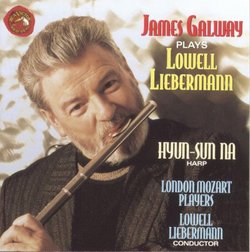| All Artists: Lowell Liebermann, London Mozart Players Title: James Galway plays Lowell Liebermann Members Wishing: 0 Total Copies: 0 Label: RCA Original Release Date: 1/1/2000 Re-Release Date: 10/13/1998 Genre: Classical Styles: Chamber Music, Forms & Genres, Concertos, Historical Periods, Classical (c.1770-1830) Number of Discs: 1 SwapaCD Credits: 1 UPC: 090266323524 |
Search - Lowell Liebermann, London Mozart Players :: James Galway plays Lowell Liebermann
 | Lowell Liebermann, London Mozart Players James Galway plays Lowell Liebermann Genre: Classical
|
Larger Image |
CD Details |
CD ReviewsI wanted to like this. William Hobbs | 12/07/2001 (1 out of 5 stars) "Having studied flute, I was excited to hear the new repertoire being hailed as an "instant classic" . . .after all doesn't the CD cover say "these compositions have become staples of the modern flute literature?" Well, give me a staple remover. How something becomes a staple within a year or two is beside the point. The music is repetitive, the harmonic language cloying, the orchestral colors almost non-existent. (I know you have to write lightly to showcase these solo instruments, but enough celesta already!) You hear a heavy John Williams influence throughout . . .unfortunately the influence does not take seed to produce an individual vocabulary. This review may not ssem "helpful" because it is so critical, but I am generally easy to please. One listen is all I could bear." This is some of the best American flute music in years. dreinornen | 10/15/1998 (5 out of 5 stars) "Lowell Liebermann is known to most flutists as one of the most prolific and outstanding composers of music for flute in recent times. The three concertos on this disc are all premiere recordings and showcase not only Liebermann's ability to write for the flute, but his powerful and lyrical sense of orchestration. Galway's recording has solidified these works as classics of the flute repertoire. What is more exciting is that these wonderful concertos are available now for everyone to hear. Highly recommended." The best flute music of the twentieth century William Hobbs | 09/28/2000 (5 out of 5 stars) "There is a very good reason why the music of Liebermann has become so popular with flautists all over the world. As we all know, the flute does not have a very large repertoire, and certainly not a large repertoire of good pieces. Although there have been some very good flute concertos written this past century, Liebermann's concerto has to be considered the strongest, on the basis of its melodic, harmonic and technical inventiveness, not to mention the wildly colorful orchestration that surpasses even the concertos of Nielsen and Ibert. An even stronger argument in Liebermann's favor is the very high percentage of standing ovations his pieces receive in concert. When was the last time YOU saw an audience rise spontaneously to its feet after the Prokofiev Sonata or a Mozart concerto? Add to this Galway's impeccable playing and you have a disc that every serious flute student should own, not to mention anyone interested in the future of American music."
|

 Track Listings (7) - Disc #1
Track Listings (7) - Disc #1